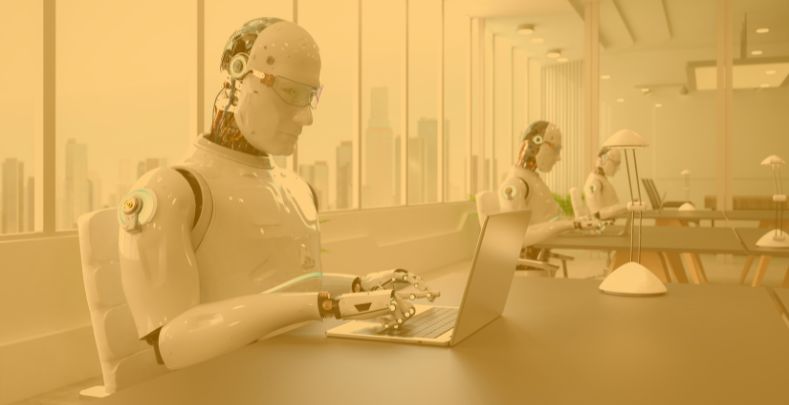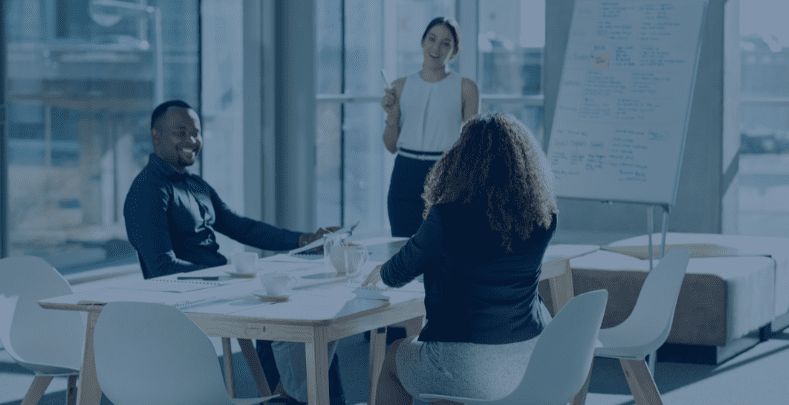Artificial intelligence. Once the domain of science fiction and fantasy, now, an everyday fact of life. It may have its share of controversy. But it also has the potential to revolutionize the way we work, and the way we manage others. So, how has performance management AI affected the workplace, and where might it go from here?
There’s still a huge gap between what AI is, and what we imagine it to be. Thanks to a steady diet of popular culture, “artificial intelligence” makes us imagine things like Terminators, HAL 9000, and Cortana. In reality, AI is far more rudimentary, although it’s improving every day. And it can already do all kinds of things. For example, we at Zensai use machine learning as part of the services we provide. But, if you’re not already familiar with how we use AI, then keep reading to find out!
Today, we want to focus on one of machine learning’s most vital workplace applications. And, of course, we’re talking about performance management AI. But, before we get into all that, let’s take a look at the bigger picture.
How AI has changed the workplace in general
The thing about artificial intelligence is that it has an incredibly broad range of potential applications. But what it boils down to in a lot of cases is its ability to do certain things much faster than humans can. The first “AI employee” available in the UK is a prominent example. This AI employee has been developed by the software company February.
The virtual employee, known as Avery Ingram, comes complete with a LinkedIn profile, ChatGPT-generated CV, and an AI-generated portrait. Avery is designed to work in software development, taking on the role of a senior full-stack developer. Avery significantly out-performs human staff, completing around 20 tickets a day. By comparison, human employees manage a daily average of three tickets.
Fascinating stuff. But what about AI’s other workplace applications?
Automation
When people talk about the societal impact of AI, they often draw parallels between it and automation. And with good reason. Industrial automation as we know it first began in the 1950s. The first of these was an industrial robot created by George Devol. Its name was Unimate, and it was designed for automotive manufacturing.
Technically, AI development began around a similar time. But the concept of machine learning wasn’t developed until a decade or two later. And, much like the industrial robots that came before it, AI can automate a lot of difficult or time-consuming functions. These include:
- Data analysis and insight development
- Chat AI
- Virtual assistants
- Personalized guidance and recommendations
Of course, it goes without saying, we’re barely scratching the surface of what you can automate using AI. That’s not even getting into physical automation, like self-driving vehicles, or AI-driven robotic workers.
Decision-making
Performance management AI is one of the higher workplace applications for machine learning. But it’s not the only one. With the right data sets, AI can be a useful tool for organisational decision-making. This ties back to its capability as a data analysis tool. Sure, you can stop with a compiled analysis. But AI has reached the point where it can even suggest data-driven courses of action. Here are some examples of AI decision-making:
- Talent acquisition
- Valuation
- Lead generation
- Project management
At the moment, many of these applications still require human oversight. But these algorithms are already at a point where human employees can use them to significantly boost their own output.
Risk management
There’s so much ambiguity when it comes to running a business. You can appear to do everything right, and still crash and burn due to any number of factors. But artificial intelligence can help make things much more clear-cut. So, what sort of risks can AI help you to manage?
Consider employee turnover. It’s an important issue for most businesses. But there are a number of ways that AI can help predict the likelihood of people leaving your organisation. Things like job tenure and sickness absence are useful data points for this. And AI can go a step further by improving workplace accountability, and monitoring rapport between managers and employees.
But AI isn’t just useful for internal risk management, but external too. You can use it to evaluate the viability of, say, potential market demographics. Or the economic viability of a given investment or project. So it’s not only for minimizing failures, but also for maximizing your successes.
Workplace safety
Workplace safety is a great example of how you’d go about training a machine learning algorithm. First, you’d establish a data-set of clear workplace hazards. Things like exposed wiring, dangerous equipment, or hygiene risks. Then you let it practice on (artificial or real) workplaces with increasingly subtle safety hazards. Whenever it misidentifies (or fails to flag up) a hazard, the AI developer corrects the behavior.
Of course, this is something of an oversimplification. AI development is, after all, very complex and time-consuming. But that’s the gist of it. Using AI for workplace safety is useful for supporting employee wellbeing in any workplace. But, in particular, it’s useful for frontline employees working in non-office-based workplaces. Places like warehouses, kitchens, construction zones and factory floors.
What are the applications for performance management AI?
Alright, that’s enough preamble. You want to know how your organisation can benefit from performance management AI, and it’s time for us to tell you.
Data-driven conversations and performance reviews
Performance conversations have long been viewed as something of a headache by both managers and employees. It’s hard for managers to be provide an objective review of a whole year. Especially when they can only clearly remember the last couple of months. Employees, meanwhile, dread the ambiguity and the possibility of unfair assessment.
But performance management AI can help managers to provide greater objectivity for their team. We’ve talked in the past about how employee check-ins are the ideal form of documentation. But Artificial Intelligence takes things a step further.
AI can break down your check-in data, your goal-tracking and everything else, on a seamless, organisation-wide scale. It can even automate a large number of performance review functions. But those are just the hard applications.
In theory, having AI process performance data means the resulting judgments are free of cognitive bias. This can do a lot to address transparency issues, like favoritism or veiled discrimination.
Continuous feedback and performance insights
This is sort of an extension of AI’s ability to automate performance management. For starters, it can do things like suggest feedback questions to ask employees based on what’s worked for similar businesses. This is actually one of the services we offer at Zensai.
Beyond that, performance management AI can track employee performance over time. How they approach tasks, the areas they excel in, and the obstacles that impact them the most. Using this data, AI can make personalized recommendations to improve employee productivity.
Of course, sometimes, it’s about the little things. Small “nudges” can significantly impact workplace behavior. For example, a steel manufacturer using “watching eye” safety posters recorded a 35% increase in employees following proper safety procedure. But there are all kinds of ways you can nudge your employees. And how do you know which ones will work?
This is where AI can help. With the right data, machine learning algorithms can suggest the ideal light-touch ways of improving employee performance and behavior.
Predictive analytics
Performance management AI can do more than help make decisions in the moment. Like that rare competent weatherperson, AI can help you to figure out what the future might bring.
We touched on one aspect of this earlier: Employee turnover. By analyzing engagement, absences, and various other factors, AI can give you an idea of who’s at risk of jumping ship. But turnover isn’t the only thing AI can predict.
For example, it can help to identify who your most career-driven people are. Who’s going to apply for that promotion if you post it internally. The right algorithm can even help you parse through candidates to find the right choice. In that sense, AI can be a very useful tool for long-term succession planning in a large organisation.
Goal-setting, alignment and monitoring
Proper goal-setting is a vital element of managing employee performance. Goals are a guiding star for your employees. A point of reference against which to measure progress. And AI can be your best friend when it comes to setting goals effectively for your people.
Take SMART Goals, for example. AI can take a huge project and find the most efficient way to break it down into milestones. That way, your people are free to get on with their work without the headache of figuring out the best approach.
As for OKRs, the right algorithm can help you ensure organisational alignment. In other words, it can spot when one of your key results is working against the objective it’s attached to.
And, finally, goal-monitoring allows AI to track performance trends in your business. This helps identify issues, or employees in need of support. But it also shows you who’s going the extra mile, as well as high or low points for productivity throughout the year.
How Zensai uses AI to benefit our clients
So, by now, you should understand how performance management AI can benefit the workplace. But what do we know about it?
Quite a bit, as a matter of fact. Machine learning algorithms have been part of Zensai’s services since our earliest days. As proof, here’s how we use AI to support our clients.
Sentiment analysis based on employee feedback
The biggest example of machine learning in Zensai is our sentiment analysis tool. Our employee check-in provides oodles of data on a weekly basis. But poring through all that can be a real headache. And there’s always the possibility that you could overlook important trends.
That’s what our sentiment analysis tool aims to prevent. It takes your check-in data, analyses it, then compiles it into a bespoke report. They’re easy to read, and full of actionable insights so you can make the most informed decisions moving forward. After all, taking action based on insight is the best way to get employees invested in your feedback process.
10Pulse engagement scores
Employee engagement is our core philosophy here at Zensai. But engagement is a bit of a complex concept. There are many contributing factors and potential roadblocks. As a result, employee engagement isn’t so easy to measure.
Lucky for you, that’s where 10Pulse engagement scores come in. 10Pulse works by analyzing employee check-in data against five criteria for employee engagement:
- Employee advocacy
- Discretionary effort
- Feeling valued
- Job satisfaction
- Pride
10Pulse even analyses things like context and written tone, and turns them into a quantifiable metric. This makes it easy to see which areas of engagement you’re succeeding in, and those that need improvement.
Best of all, you’re able to compare different teams and departments against each other. So you can use one team of employees as a test-case for engagement strategies, and see their effectiveness by using other teams as control groups. And, with 10Pulse measuring engagement, you don’t have to bog employees down with additional pulse surveys.
Choosing ideal check-in questions
These last two points are ones we touched on earlier. So, we’ll be brief. First off, Zensai uses machine learning to suggest the ideal questions for your employee check-ins.
It does this by cross-referencing your businesses with check-in data from similar organisations. That means the suggestions it makes are informed by what works well for other companies in your sector. Remember, your check-ins are only as good as the consideration you put into them.
Goal monitoring
The benefits of goal-tracking extend beyond the immediate guidance they give employees. Using performance management AI for goal monitoring is useful for tracking productivity trends throughout the year. And, with Zensai, our in-built goal-tracking feeds into this without any complicated extra steps.
So, for example, goal monitoring might reveal your staff are less productive in summer. Or it might show you who your most frequent MVPs are. Goal monitoring shows managers where their support efforts are needed most. And, once you’ve started using it, you’ll wonder how you ever got by without it.
So, there you have it. AI is one of the biggest hot-button issues of our time. But, whether it excites or concerns you, one thing is clear. And it’s that performance management AI is going to revolutionize the way we work.










